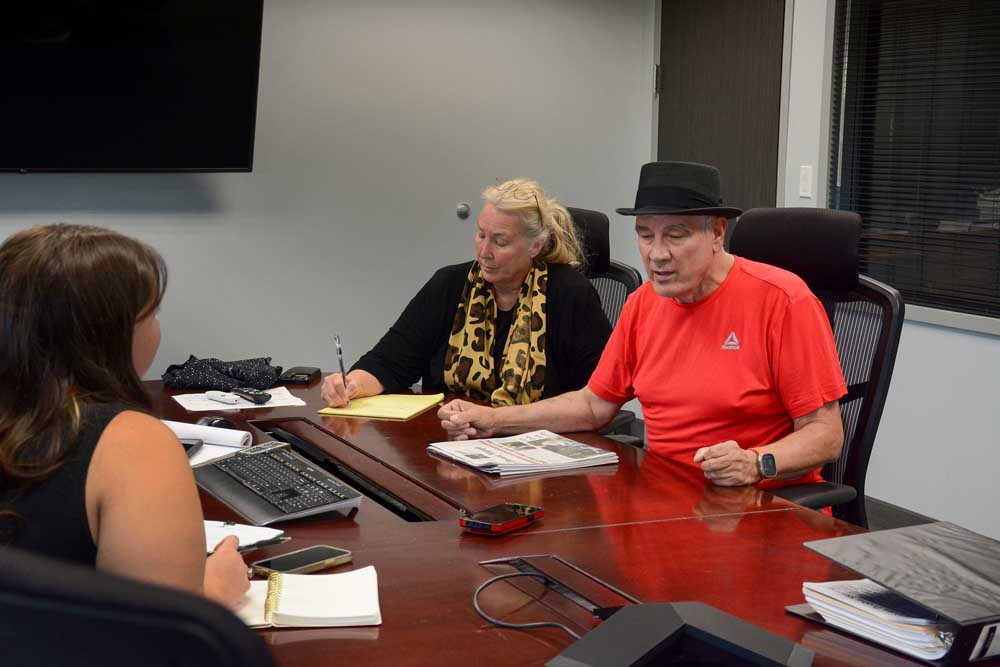In civil lawsuit, Kerry Max Cook continues quest for justice
Published 9:00 am Monday, November 18, 2024

- Kerry Max Cook, 68, speaks to Tyler Morning Telegraph reporter Katecey Harrell on Thursday afternoon during an interview at the newspaper’s downtown Tyler office as his wife Sandra Pressey looks on. (Santana Wood/Tyler Morning Telegraph)
After a nearly five-decade battle to clear his name, Kerry Max Cook is now seeking accountability for the misconduct that led to his wrongful conviction in the 1977 Tyler murder of 21-year-old Linda Jo Edwards.
“I was silenced before,” Cook said Thursday afternoon during an interview at the Tyler Morning Telegraph office after his legal team filed a civil lawsuit earlier that day. “They had it their way. Now it’s different. Now I’m the prosecutor. I get to hold them accountable for Linda, and for me.”
Trending
Cook, 68, explained he had previously been focused on proving his innocence as a criminal defendant. Now, he said the tables have turned; he is no longer a defendant but a plaintiff. The purpose of the legal battle ahead is to hold accountable those responsible — specifically law enforcement — for the misconduct Cook said caused him pain and suffering for the past 47 years.
Cook’s attorneys filed the suit Thursday in the United States District Court for the Eastern District of Texas Tyler division against the City of Tyler, Smith County and 15 current or former law enforcement officers as defendants including Eddie Clark, Eric Liptak, Douglas Collard, Robert Bond, Gerald Hayden, Nelson Downing, Fred Mayo, Kenneth Findley, Ronald Scott, Ronnie Malloch, Marvin T. McLeroy, Stuart Dowell, Jake Massey, J.B. Smith and Gene Carlson.
The suit asks a federal jury to determine damages for multiple violations of Cook’s rights under U.S. law, including violations of due process, malicious prosecution, destruction of evidence, and conspiracy.
“For over 20 years I fought for my life from a death row cell,” Cook said. “After being kicked out the back door of Smith County’s legal system in 1999, I fought for another 25 years to clear me and my family’s name.”
In June of this year, the Texas Court of Criminal Appeals declared Cook actually innocent of Edwards’ murder. In that opinion, the court found instances of prosecutorial misconduct, proof of false testimony, admissions of perjury and new scientific evidence that led to Cook spending 20 years on death row for the crime he didn’t commit.
“… but my struggle does not end there,” Cook said. “Today, I am pressing forward with a civil suit against the officers who framed me, and against the broken Tyler and Smith County police agencies that let it happen.”
Trending
In the suit, Cook alleges the misconduct was the result of policies and practices of the City of Tyler and Smith County which included employees and agents regularly failing to disclose exculpatory evidence, fabricating false evidence, coercing false witness testimony, pursuing wrongful prosecutions and violating due process.
Cook was convicted in 1978 of the murder of Edwards, whose mutilated body was discovered by her roommate in their apartment. Cook’s legal team says James Mayfield, with whom Edwards was having an affair, was an “obvious suspect” yet he was never arrested or formally accused.
The lawsuit alleges investigating officers “chose instead to focus on Cook.”
“Cook had met Ms. Edwards earlier in the week and been invited back to her apartment. Fingerprints he left on the sliding glass door of her apartment during that visit became the entire basis for a bizarrely fabricated case against Mr. Cook, which today’s complaint describes as ‘a homosexual witch-hunt’ based on the officers’ belief that Mr. Cook was gay,” the document states.
The complaint alleges defendants “actively and systematically disregarded, downplayed, and concealed obvious evidence” pointing to Mayfield. That alleged fabrication includes “bogus fingerprint analysis, withheld exculpatory evidence, and coerced false statements and testimony from witnesses,” the document states.
Cook said he was “framed,” leading to his conviction and ultimate death sentence. In 1988, he was 11 days from his scheduled execution when the U.S. Supreme Court ordered Texas to review the case. After multiple appeals and two new trials — in one of which he was convicted and sentenced to death again — he ultimately accepted a no-contest plea with credit for the 20 years he’d served and was released in 1999. Since then, Cook has continued to put up a fight to clear his name.
This week’s lawsuit follows the June declaration of innocence, in which Judge Bert Richardson wrote in the decision: “When it comes to solid support for actual innocence, this case contains it all — uncontroverted Brady violations, proof of false testimony, admissions of perjury, and new scientific evidence.”
Cook wants justice for the harm he said was caused by the defendants. The suit also requests compensation for the decades of lost freedom and suffering — a hardship Cook says continues to this day. However, Cook says this suit is not about money. It’s about justice, accountability and exposing the truth, he said.
“They’re trying to bury their mistake,” Cook said Thursday. “The evidence is there, they can’t deny it … We’re going to be able to expose it to the world … This is a brand new day.”
In addition to the trauma gained from wrongful prosecution and imprisonment, Cook suffers physical and psychological pain, anxiety, depression and other lasting impacts due to the defendants’ actions, the suit states. He endured the loss of liberty, mental anguish, humiliation and ongoing emotional distress. Cook said he still deals with people thinking he’s guilty, even after the 106-page decision that formally exonerated him and solidified his true innocence.
Cook said it’s frustrating to be judged, knowing he’s innocent. But he says ultimately this quest for justice is about far more than just him, as this could happen to anyone.
“It’s not about revenge, it’s not about anger; it’s about a horrible thing that was done to me. Every part of the system has failed all the way until the Court of Appeals finally set me free,” Cook said. “This is about justice and accountability.”
A number of “suspicious and troubling elements” to the case were largely ignored, according to the June opinion, including the fact a number of witnesses had to be given immunity in exchange for their testimonies. Additionally, Cook says the defendants framed him and painted him to be a homosexual, “Hannibal Lecter-type” monster, and carried on with a narrative that he fit a profile of someone who could commit such a heinous crime. He said those responsible for the misconduct were willing to see him die just to keep up a lie.
Cook is represented in his suit by attorneys Anand Swaminathan, Jon Loevy, and Alison Leff of the civil rights law firm Loevy + Loevy.
“The layers upon layers of police misconduct in this case are staggering,” Swaminathan said. “Each time investigators learned of more evidence pointing to Kerry’s innocence or pointing to Mayfield’s guilt, they ignored it and instead made up new evidence to support their bizarre fantasy of a homosexual ‘lust-murder.’ They were so committed to this baseless theory that they ignored the obvious suspect, one with a clear motive and opportunity. Kerry’s 47-year nightmare is a stark reminder of what happens when the justice system cares more about winning at all costs than it does about the truth.”
Following the June decision of actual innocence, a Smith County court in October dropped the original indictment against Cook. Smith County District Attorney Jacob Putman and Assistant Criminal DA Michael J. West filed the motion in the 241st District Court on behalf of the State of Texas to dismiss the indictment on the grounds that the Court of Criminal Appeals found Cook to be “actually innocent of the offense alleged by the indictment in this case,” the motion reads. After reviewing the motion, Judge Austin Reeve Jackson dismissed the indictment and formally dropped all charges against Cook in the death of Edwards.
Justice still eludes for Edwards, whose killer was never formally determined or prosecuted, and her family.
In the time since his release, Cook married his wife Sandra Pressey and had a son, Kerry Justice. Cook has made a career of being an inspirational speaker, talking to youth and adults worldwide on overcoming adversity. Cook is also an author, a facilitator, media consultant and law school presenter.
The Tyler Morning Telegraph has reached out the the City of Tyler and Smith County, respectively, requesting comment. Representatives from each entity said they could not comment on pending litigation.
To read the full lawsuit, visit https://tinyurl.com/kerrymaxcookcivilsuit .







